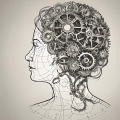And we all have hormones. Those wonderfully mysterious chemicals circulating and cycling with the regularity and rapidity that makes one’s head spin, female hormones are at once the bane and the joy of man’s existence. Our hormones are what make us find you attractive, laugh at your jokes, date you, sleep with you and bear your children. Our hormones can also turn us into stark, raving lunatics at seemingly benign comments. Most men know and understand this, at least intuitively. You are prepared for the ‘wrath of raging hormones’ if not from direct experience with your mothers, sisters or girlfriends, then from the many locker room and sitcom epithets ever present in modern culture.
What most men (and many women) are not prepared for, and I’d venture don’t understand, is the very real chemistry changes behind the wrath. Much of this goes far beyond just mood changes, often eliciting a bevy of symptoms and disease processes that we’re only now beginning to understand.
In many ways, hormones are just like every other chemical circulating in our bodies, regulating this system or that, entirely responsible for certain functions, secondary and tertiary players in others. Men have the same hormones as women, just in different concentrations. And hormones cycle in men, but not so radically and regularly. What is different between ‘men’s hormones’ and ‘women’s hormones’ is not the hormones themselves, but the systems and structures on which they operate and the reproductive functions that ensue.
To state the obvious, women have ovaries and a uterus. Those structures, along with the brain form the foundation of a beautifully orchestrated and incredibly complex chemical feedback system that not only controls reproduction, but influences just about every aspect of our lives. Estradiol and progesterone concentrations increase several fold across an average cycle, preparing the uterus for a possible pregnancy. In the absence of pregnancy, hormone levels plummet and the lining of uterus, the endometrium sheds. The all-too-familiar mood changes and pain commence.
As a man viewing this process from the outside, it is difficult to appreciate the magnitude of hormone changes affecting the women in your life. When hormones act on the brain or in the body, they do so in much the same manner as many common drugs. In terms of chemistry, menstrual cycle hormone changes are very similar to a drug addiction/withdrawal pattern with increasing dosages of stimulants (like amphetamines) during the first two weeks, a combo pack of sedatives (like Valium or alcohol) plus a few stimulants during the second two weeks, followed by cold turkey withdrawal. Rinse and repeat, over and over again, approximately 450 times during the course of her lifetime. Pregnancy and postpartum follow the same pattern only the dosage of hormones, the duration of exposure and the magnitude of the withdrawal are increased exponentially. The veritable cocktail of hormones that make these functions possible is breathtaking.
What happens when one or more of these chemical messengers gets a little out of sync and the system become dysregulated, as is inevitable in any system that cycles so frequently? Or what happens when an illness or disease, maybe not caused by hormones, develops in the context of this ever fluctuating female chemistry? You get a bit of chaos (think butterflies, not randomness).
As a man, who has women in his life, you have two choices, ignore and avoid the chaos and hope there are no storms on the horizon, or embrace the chaos and find ways to anticipate and alleviate the pain. Many choose the former, including much of medical science. This is the avoidable ignorance, I wrote about last week. I’d like to think the men who love us, choose the latter. Certainly, the men who shared their wives’ and daughters’ stories recognize the need to investigate and develop better treatments for women. They may not understand fully the complexity of women’s hormones, but they understand the suffering, sense that symptoms are being ignored and want nothing more than to make it all better.




